|
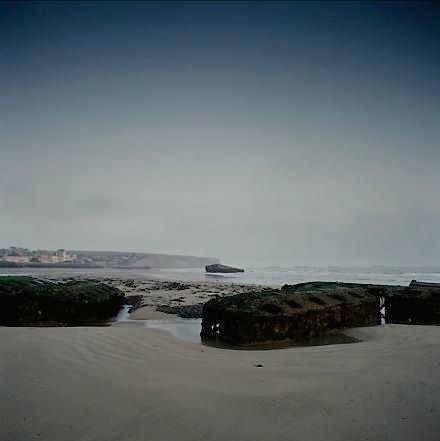
Metamorphosis and Myth
20th Century European Battlefields
Peter Hebeisen
_______________________
Transversal journal 10/11:
#occupy and assemble8 (2011)
editorial
"From the sit-ins on the Kasbah Square in Tunis to the tents on Rothschild Boulevard in Tel Aviv, from the encampments on the Puerta del Sol in Madrid to Syntagma Square in Athens, from the Wisconsin Uprising to Occupy LA, from Tahrir Square in Cairo to Liberty Plaza in New York - there is an incredible movement of occupations growing in this year of 2011. Slogans like “They don’t represent us” call for a non-representationist political practice, inventive forms of assembling bring new meaning to the good old general assembly, reappropriations of space and time thwart the logic of private and public: There is a new abstract machine in the making, traversing the local practices, empowering itself with every new space that is occupied, every new assembly that finds another form of expression and sociality. This issue of transversal is a discursive component of this abstract machine emerging from the actual experiences of Occupy Wall Street, dedicated to all the precarious occupiers in the world."
eipcp
european institute for progressive cultural policies
Bodies in Alliance and the Politics of the StreetJudith Butler
In the last months there have been, time and again, mass demonstrations on the street, in the square, and though these are very often motivated by different political purposes, something similar happens: bodies congregate, they move and speak together, and they lay claim to a certain space as public space. Now, it would be easier to say that these demonstrations or, indeed, these movements, are characterized by bodies that come together to make a claim in public space, but that formulation presumes that public space is given, that it is already public, and recognized as such. We miss something of the point of public demonstrations, if we fail to see that the very public character of the space is being disputed and even fought over when these crowds gather. So though these movements have depended on the prior existence of pavement, street, and square, and have often enough gathered in squares, like Tahrir, whose political history is potent, it is equally true that the collective actions collect the space itself, gather the pavement, and animate and organize the architecture. As much as we must insist on there being material conditions for public assembly and public speech, we have also to ask how it is that assembly and speech reconfigure the materiality of public space, and produce, or reproduce, the public character of that material environment. And when crowds move outside the square, to the side street or the back alley, to the neighborhoods where streets are not yet paved, then something more happens. At such a moment, politics is no longer defined as the exclusive business of public sphere distinct from a private one, but it crosses that line again and again, bringing attention to the way that politics is already in the home, or on the street, or in the neighborhood, or indeed in those virtual spaces that are unbound by the architecture of the public square. So when we think about what it means to assemble in a crowd, a growing crowd, and what it means to move through public space in a way that contests the distinction between public and private, we see some way that bodies in their plurality lay claim to the public, find and produce the public through seizing and reconfiguring the matter of material environments; at the same time, those material environments are part of the action, and they themselves act when they become the support for action. ...(more)
_______________________
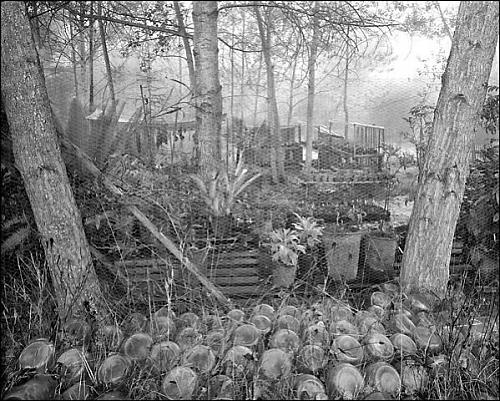
Arboretum
Joel Leivick
1986
_______________________
De singes et de mouches (extraits) / from Of Flies and Monkeys
Jacques Dupin
Translated by John Taylor
A poem is not made of words
George Oppen
even borborygmies
even monkey
onomatopoeias
passing beyond all bounds of the mouth
empty promises
of monkey money fly money
coins tinkling
under the wound
— and the heart apes the fly
and monkeys
blow their nose like flies
sniffing a departed heart
...(more)
Jacques Dupin's Poetic Language: A Process of Becoming, of Blossoming
Translator's Note
John Taylor
Cerise PressVol. 3 Issue 7
via The Page_______________________

Autumn
1944
Milton Avery
1893 -1965
_______________________
Punching A Hole In Bubbles Of Denial And Addiction
Late Capitalism and Its Discontents of the American Autumn
Phil Rockstroh
(....)
As Autumn stands before us, it will be helpful to allow illusions to fall away like dying leaves. Summer is kind to fools, but winter insists on clarity. Let the old delusions blaze out in Autumnal splendor, and then be mindful of winter’s stark perfection…its demarcations…rendering bare branches against a bleak sky.
Know this: The illusions of the corporate empire can no longer provide shelter; the elite and operatives of economic imperium can no longer raid and plunder the easy pickings of summer…hoard and squander its bounty. Therefore, to quote the poet, at present, “One must have a mind of winter” to navigate the white-out winds of new realities....(more)
_______________________
CHARTS: Here's What The Wall Street Protesters Are So Angry About...
Business Insider
_______________________
Reflections for the US Occupy Movement
From Barcelona's Neighborhood Assemblies
Peter Gelderloos
(....)
The memory of struggles from before the global economic crash has allowed people to move beyond a simple kneejerk response to the present crisis and instead formulate a deeper critique of the system responsible for their woes. In practice, this has meant a popular shift from complaints about specific laws or specific features of the banking system that might serve as scapegoats for the crisis, to a radical critique of government and capitalism. While the movement is heterogeneous and by no means consistent, on multiple occasions it has popularly defined itself as anticapitalist, thus drawing on a strong tradition of struggle that goes back more than a century throughout Europe.
(....)
The United States is also a country with inspiring histories of popular struggle. But it is a country with a case of social amnesia like no other. It seems that to a certain extent, the Occupy Wall Street actions exist more as a trend than anything else. The slight extent to which they draw on, or even make reference to, earlier struggles, even struggles from the past twenty years, is worrying. The fact that a present awareness of US history would shatter certain cornerstones of the new movement’s identity, for example this idea of the 99% that includes everyone but the bankers in one big, happy family, is not a sufficient excuse to avoid this task. The historical amnesia of American society must be overcome for a struggle to gain the perspective it needs....(more)
_______________________

last village
Tomas Cochello
_______________________
Creativity vs. Copyright
Cory Doctorow
(Newly revised and condensed from his address to the 2010 World Science Fiction Convention
(....)
If you swipe a DVD from a shop you get a small fine, or if you’ve done it hundreds of times maybe you get some community service—but we don’t come to your house and say, OK, we’re going to cut you off from all the services that deliver freedom of speech, freedom of assembly, freedom of the press, access to tools, communities, and ideas, access to education, and civic engagement.
This not a principle we think of as belonging in the justice systems of enlightened countries. People like me fight for copyright reform not because we’re cheap and we want DVDs for free but because, in the name of preventing piracy, corporations and governments are attacking fundamentals like the right to assemble, the right to free speech, the right to operate a free press and the right to organize and work together. Information doesn’t want to be free, people do! Artists need to transcend the self-serving, terrorized, crappy narrative that’s been fed to us by the copyright industries and recognize that the collateral damage from this doomed effort to reduce copying includes the free society that we all cherish.
And there are organizations that will help us. In Australia there’s Electronic Frontiers Australia; worldwide there’s Electronic Frontiers Foundation, Creative Commons, and many other organizations that work for a balanced copyright regime that respects all the civil liberties that are part of a free society and also tries to insure that artists can go on earning their livings as well.
Cory Doctorow, in his chapbook The Great Big Beautiful Tomorrow
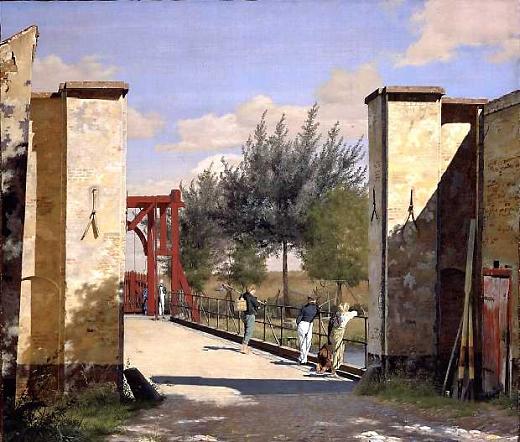
The North Gate of the Citadel
Christen Kųbke
1834
via Hippolyte Bayard
_______________________
Twilight of the Idols
Friedrich Nietzsche [ 1895 ]
Text prepared from the original German
and the translations by Walter Kaufmann and R.J. Hollingdalevia Tom Matrullo
_______________________
The Fight for 'Real Democracy' at the Heart of Occupy Wall Street
Michael Hardt and Antonio Negri
Foreign Affairs
_______________________
A call to the army of love and the army of software
Franco Berardi and Geert Lovink
posted by Jodi Dean
The fight opposing financial dictatorship is erupting.
The so-called ‘financial markets’ and their cynical services are destroying the very foundations of social civilization. The legacy of the postwar compromise between the working class and progressive bourgeoisie has all but disappeared. Neoliberal policies are cutting back education and the public health system and is cancelling the right to a salary and a pension. The outcome will be impoverishment of large parts of the population, a growing precarity of labor conditions (freelance, short-term contracts, periods of unemployment) and daily humiliation of workers. The yet to be seen effect of the financial crisis will be violence, as people conjure up scapegoats in order to vent their rage. Ethnic cleansing, civil war, obliteration of democracy. This is a system we call financial Nazism: FINAZISM.
(....)
Will our demonstrations and occupations stop the Finazist machine? They will not. Resistance will not resist, and our fight will not stop the legal crimes. Let’s be frank, we will not persuade our enemies to end their predatory attacks (‘let’s make even more profit from the next downfall’) for the simple reason that our enemies are not human beings. They are machines. Yes, human beings – corporate managers, stock owners, traders – are cashing the money that we are losing, and prey upon resources that workers produce. Politicians sign laws that deliver the lives of millions of people to the Almighty God of the Market.
Bankers and investors are not the real decision makers, they are participants in an economy of gestural confusion. The real process of predatory power has become automated. The transfer of resources and wealth from those who produce to those who do nothing except oversee the abstract patterns of financial transactions is embedded in the machine, in the software that governs the machine. Forget about governments and party politics. Those puppets who pretend to be leaders are talking nonsense. The paternalistic options they offer around ‘austerity measures’ underscore a rampant cynicism internal to party politics: they all know they lost the power to model finance capitalism years ago. Needless to say, the political class are anxious to perform the act of control and sacrifice social resources of the future in the form of budget cuts in order to ‘satisfy the markets’. Stop listening to them, stop voting for them, stop hoping and cursing them. They are just pimps, and politics is dead.
What should we do?...(more)
I cite
_______________________

Gables Bound in Weed
Richard Maloney
via Gary Sauer-Thompson
_______________________
Five Poems by Sarah Gridley
Mudlark Poster No. 78 (2009)
The Orator’s Maximal Likelihood
In turning your heart to a pulpit, you captured
a sample of persuasion: gray, the passenger
pigeons, the migrateurs, gray the epigraphical palettes,
the small, uncertain laughters
at the cages of animals.
There is a hard work you ate in honey.
There is a hard work in parts of speech.
Once you lost track of statistics, dust arose
to reckon cobwebs. The errand is all
about you: a demon sings, the song is yours,
a fog catcher catches condensation.
On the strength of its first thread, a spider commits
design, commits its body’s lengths
to measurements of silk.
Page the page.
Where is now the outline of the law? A left-out word
like gossamer. A word left out like grace.
...(more)
Weather Eye Open and Green is the OratorSarah Gridley University of California Press_______________________

Die Verhältnisse
Paula Markert
_______________________
Williams / Ashbery
John Latta
Isola di Rifiuti
(....)... Williamsesque: “the stark dignity of entrance . . .” Struck, reading the Autobiography, by Williams’s sense of the “underground stream” of poetry (released by thwart changeable vicissitudes of doctoring):
Forget writing, it’s a trivial matter. But day in day out, when the inarticulate patient struggles to lay himself bare for you, or with nothing more than a boil on his back is so caught off balance that he reveals some secret twist of a whole community’s pathetic way of thought, a man is suddenly seized again with a desire to speak of the underground stream which for a moment has come up just under the surface. It is just a glimpse, an intimation of all that which the daily print misses or deliberately hides, but the excitement is intense and the rush to write is on again. It is then we see, by this constant feeling for a meaning, from the unselected nature of the material, just as it comes in over the phone or at the office door, that there is no better way to get an intimation of what is going on in the world. ...(more)
_______________________
Five Poems
Sarah Gridley
conjunctions
Grimoire
One helped undo the rippled look of things beyond the pane. One called for writing on the pane. One seemed to aim at suffocation. One promised the end result of breathing freely. One made use of dead though iridescent wings. One said to drink from the mirror, while another took bowls and bowls of blood. One called for moss on top of blood. One required no words at all. One turned a black stone green with just one word. One made the horses bolt. One crushed a plant for the end of a sorrow. One derived a forest from pendant ghosts. One was a spell for no more spells. For cutting them down, and letting them go.
...(more)
_______________________

Autumn Morning
Lake Sortedam
Christen Kųbke
1838
_______________________
Everyday Speech
Maurice Blanchot
Translated by Susan Hanson
mediafire pdf
(....)Whatever its other aspects, the everyday has this essential trait: it allows no hold. It escapes. It belongs to insignificance, and the insignificant is without truth, without reality, without secret, but perhaps also the site of all possible signification. The everyday escapes. This makes its strangeness - the familiar showing itself (but already dispersing) in the guise of the astonishing. It is the unperceived, first in the sense that one has always looked past it; nor can it be introduced into a whole or "re- viewed," that is to say, enclosed within a panoramic vision; for, by another trait, the everyday is what we never see for a first time, but only see again, having always already seen it by an illusion that is, as it happens, constitutive of the everyday.
Hence the exigency - apparently laughable, apparently inconse- quential, but necessary - that leads us to seek an always more immediate knowledge of the everyday. Henri Lefebvre speaks of the Great Pleonasm. We want to be abreast of everything that takes place at the very instant that it passes and comes to pass. The images of events and the words that transmit them are not only inscribed instantaneously on our screens, in our ears, but in the end there is no event other than this movement of universal transmission: "the reign of an enormous tautology." The disad- vantages of a life so publicly and immediately displayed are henceforth observable. The means of communication-language, culture, imagina- tive power-by never being taken as more than means, wear out and lose their mediating force. We believe we know things immediately, without images and without words, and in reality we are dealing with no more than an insistent prolixity that says and shows nothing. How many people turn on the radio and leave the room, satisfied with this distant and sufficient noise? Is this absurd? Not in the least. What is essential is not that one particular person speak and another hear, but that, with no one in particular speaking and no one in particular listening, there should nonetheless be speech, and a kind of undefined promise to communicate, guaranteed by the incessant coming and going of solitary words. ...

photo - mw
_______________________
If our life were an eternal standing by the window, if we could remain there for ever, like hovering smoke, with the same moment of twilight forever paining the curve of the hills.... If we could remain that way for beyond forever! If at least on this side of the impossible we could thus continue, without committing and action, without our pallid lips sinning another word!
Look how it's getting dark! ...The positive quietude of everthing fills me with rage, with something that's a bitterness in the air I breathe. My soul aches ... A slow wisp of smoke rises and dissipates in the distance... A restless tedium makes me think no more of you...
All so superfluous! We and the world and the mystery of both.
The Book of Disquiet
Fernando Pessoa
edited and translated by Richard Zenith
_______________________
Dismantling the House
Stephen Dunn
Rent a flatbed with a winch.
With the right leverage
anything can be hoisted, driven off.
Or the man with a Bobcat comes in,
then the hauler with his enormous truck.
A leveler or a lawyer does the rest;
experts always are willing to help.
The structure was old, rotten in spots.
Hadn't it already begun to implode?
Believe you've just sped the process up.
Photographs, toys, the things that break
your heart—let's trust
they would have been removed,
perhaps are safe with the children
who soon will have children of their own.
It's over. It's time for loss to build
its tower in the yard where you
are merely a spectator now.
Admit you'd like to find something
discarded or damaged, even gone,
and lift it back into the world.
Poetry (February 2003)
Stephen Dunn at the Poetry Foundation_______________________
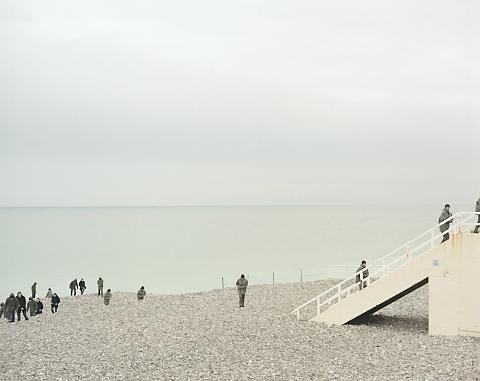 intervales
Mathieu Bernard-Reymond
_______________________
Art of the Anthology:
An Interview with Jerome Rothenberg by Travis Macdonald (Part Two)
(....)
... I should point out that when you're actually doing a complicated anthology, there are lots of other factors that come into it. There are limitations of space and the question of how much space is needed. In the mind, as a mental construct,we can incorporate an endless amount of material. In a book, even a big book, you're limited to often 400 or 500 pages. My next big anthology is 900 pages, but that's to cover a whole century and with as much of a global dimension as we can manage.
The internet may promise something entirely different. Maybe, if one isn’t forced to mimic the way things are arranged or positioned in anthologies and books. I once made a joke in an interview with Chris Funkhouser, when Poems for the Millennium first came out, that there should be an Anthology of Everything. Maybe the internet will make that possible. Maybe the internet IS that anthology.
...(more) _______________________
from Taking-Light [Agaw-Liwanag]
Bomen Guillermo
Translated by Jose Perez Beduya and Allan Popa
(....)
IV
There is no road leading back from a path going forward
world is what departs
world is what is departed from
There is a letter needing
to be delivered
inside the mouth
There is no path leading forward from a road going back
world is what is departed from
world is what departs
...(more)
High Chair # 14
January - June 2011
_______________________

deux échelles
disparitions
Mathieu Bernard-Reymond
_______________________
“We are not dreamers, we are the awakening from a dream which is turning into a nightmare”
Slavoj ˇi˛ek
(....)The only sense in which we are Communists is that we care for the commons—the commons of nature, of knowledge—which are threatened by the system.
They will tell you that you are dreaming, but the true dreamers are those who think that things can go on indefinitely they way they are, just with some cosmetic changes. We are not dreamers, we are the awakening from a dream which is turning into a nightmare. We are not destroying anything, we are merely witness how the system is gradually destroying itself. We all know the classic scene from cartoons: the cat reaches a precipice, but it goes on walking, ignoring the fact that there is no ground under its feet; it starts to fall only when it looks down and notices the abyss. What we are doing is just reminding those in power to look down......(more)
_______________________
Landscape at the End of the Century
Stephen Dunn
The sky in the trees, the trees mixed up
with what's left of heaven, nearby a patch
of daffodils rooted down
where dirt and stones comprise a kind
of night, unmetaphysical, cool as a skeptic's
final sentence. What this scene needs
is a nude absentmindedly sunning herself
on a large rock, thinks the man fed up
with nature, or perhaps a lost tiger,
the maximum amount of wildness a landscape
can bear, but the man knows and fears
his history of tampering with everything,
and besides to anyone who might see him
he's just a figure in a clearing
in a forest in a universe
that is as random as desire itself,
his desire in particular, so much going on
with and without him, moles humping up
the ground near the daffodils, a mockingbird
publishing its cacaphonous anthology,
and those little Calvinists, the ants,
making it all the more difficult
for a person in America
to close his office, skip to the beach.
...(more)
_______________________

thanksgiving
Renfrew county
photo - mw
_______________________
Autumn Comes
Li Ho (790-816)
Translated by Arthur Sze
Wind in the plane tree startles the heart: a grown man's grief.
By dying lamplight, crickets are weeping cold threads.
Who will ever read the green bamboo slips of this book?
Or stop the ornate worms from gnawing powdery holes?
Such thoughts tonight must disentangle in my gut.
In the humming rain, a fragrant spirit consoles this poet.
On an autumn grave, a ghost chants Pao Chao's poem,
and his spiteful blood, buried a thousand years, is now green jade.
Poems from Arthur Sze's The Silk Dragon:Translations from the Chinese
drunken boat courtesy of Copper Canyon Press

photo - mw
_______________________
Poem In October
Dylan Thomas
My birthday began with the water-
Birds and the birds of the winged trees flying my name
Above the farms and the white horses
And I rose
In a rainy autumn
And walked abroad in shower of all my days
High tide and the heron dived when I took the road
Over the border
And the gates
Of the town closed as the town awoke.
A springful of larks in a rolling
Cloud and the roadside bushes brimming with whistling
Blackbirds and the sun of October
Summery
On the hill's shoulder,
Here were fond climates and sweet singers suddenly
Come in the morning where I wandered and listened
To the rain wringing
Wind blow cold
In the wood faraway under me.
...(more)
_______________________
What If Everything We Know About Economic Policy is Wrong?
Dan Ciuriak and John M. Curtis
Abstract:
Like other sciences, economics shows long periods of gradual refinement of theory and the steady accretion of empirical evidence, punctuated by the occasional sea change in world views. Thus the history of economic thought and practice reveals distinctive eras characterized by differences in what was considered conventional wisdom by informed lay persons and policy practitioners, differences in institutional frameworks, and differences in the preoccupations of the leading theoreticians. An example of such a change came in the pivotal decade of the 1970s from the Bretton Woods era package of Keynesian demand management, fiscal policy pre-eminence, fixed exchange rates, and New Deal welfare economics to the neoliberal combination of supply-side public policy, monetary policy pre-eminence, floating exchange rates and an emphasis on market disciplines and incentives that has dominated since. This paper argues that a similar confluence of pressures, contradictions and policy impotence that accompanied the paradigm shift of the 1970s is in evidence today and argues for a fundamental re-appraisal of what is presently considered conventional wisdom - i.e., of what we "know" about economics today.
Social Science Research Network (SSRN)
_______________________
Occupy Everything
James Howard Kunstler
Language is failing us, of course. When speaking of "recession," one is forced into using the twisted, tweaked, gamed categories of economists whose mission is to make their elected bosses look good in spite of anything reality says. I prefer the term contraction, because a.) that is what is really going on, and b.) the economists haven't got their mendacious mitts around it yet. Contraction means there is not going to be more, only less, and it implies that a reality-based society would make some attempt to acknowledge and manage having less - possibly by doing more.
(....)
All of the action right now has the weird aura of being an overture to the year 2012, fast approaching as we slouch into the potentially demoralizing holidays of the current year. I don't subscribe to Mayan apocalypse notions, but there's something creepy about the wendings and tendings of our affairs these days. OWS is nature's way of telling us to get our shit together, or else. This means a whole lot more than bogus "jobs" bills and Federal Reserve interest rate legerdemain. It means coming to grips with the limits of complexity and purging the system of the idea that anything is too big to fail. What happens when Occupy Wall Street becomes Occupy Everything, Everywhere?...(more)
_______________________

photo - mw
_______________________
Night Comes Down: Night Falls
Brad Zellar
(....)
Ultimately,towards dawn, you were always left with nothing but the barely-beating heart of the sleeping world. The ceaseless surf of even the smallest quiet town. The furnace. The pining of the clock. The world on the back burner, as close as the modern world comes to stasis: You were left with only you and what was left of the night, the retreating darkness, shadows receding on the walls, the cruel pinch of exhaustion, the terrible reality that you were going to have to sleepwalk through another lost day. What was that they were saying about what?
...(more)
_______________________
End of Summer
Stanley Kunitz
1905 - 2006
An agitation of the air,
A perturbation of the light
Admonished me the unloved year
Would turn on its hinge that night.
I stood in the disenchanted field
Amid the stubble and the stones,
Amazed, while a small worm lisped to me
The song of my marrow-bones.
Blue poured into summer blue,
A hawk broke from his cloudless tower,
the roof of the silo blazed, and I knew
that part of my life was over.
Already the iron door of the north
Clangs open: birds, leaves, snows
Order their population forth,
And a cruel wind blows.
_______________________

photo - mw
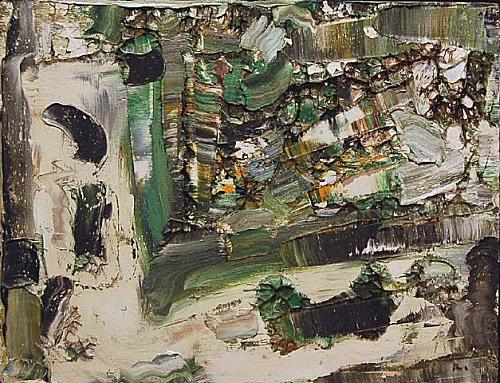
Jean Paul Riopelle
_______________________
Prelude
Tomas Tranströmer
Translated by Rika Lesser
words without borders
Waking up is a jump, a skydive from the dream.
Free of the smothering whirl the traveler
sinks toward morning's green zone.
Things start to flare. ......
...(more)
_______________________
Small Memories
José Saramago
translated by Margaret Jull Costa
(....)
Many years later, using the words of the adult he then was, the adolescent would write a poem about that river — a humble stream of water that is now polluted and fetid — where he had bathed and which he had navigated. He called it "Protopoem" and here it is: "Out of the tangled skein of memory, out of the darkness of its inextricable knots, I tug at what appears to be a loose end./ Slowly I pull it free, afraid it might fall to pieces in my fingers./ It's a long thread, green and blue, and smells of slime, warm and soft as living mud./ It's a river./ It drenches my now wet hands./ The water flows over my outspread palms, and suddenly I'm not sure if the water is flowing out of me or washing over me./ I continue to tug at the thread, which is not just a memory now, but the actual body of the river itself./ Boats sail over my skin, and I am the boats and the sky above them, and the tall poplars that slide serenely across the luminous film of my eyes./ Fish swim in my blood and hesitate between staying too near the surface and plumbing the depths, just like the vague summonses issued by memory./ I feel the strength of my arms and the pole that prolongs them./ It pushes down into the river and into me like a slow, steady heartbeat./ Now the sky is nearer and has changed color./ It's all green and full of singing because the songs of birds are springing awake on every branch./ And when the boat stops in a large clearing, my naked body gleams in the sun, among the still brighter light igniting the surface of the waters./ There, memory's confused recollections and the suddenly revealed face of the future fuse into one truth./ A nameless bird appears out of nowhere and perches silently on the stiff prow of the boat./ I wait motionless for the whole river to be bathed in blue and for the birds on the branches to explain to me why the poplars are so tall and their leaves so full of murmurings./ Then, with the body of the boat and the river safely back in the human dimension, I continue on toward the golden pool surrounded by the raised swords of the bulrushes./ There I will bury my pole two feet down in the living rock./ A great primordial silence will fall when hands join with hands./ And then I will know everything." No one can know everything or ever will, but there are moments when we're capable of believing that we will, perhaps because at that moment, soul, consciousness, mind, or whatever you care to call the thing that makes us more or less human, was filled to overflowing. I gaze down from the bank at the barely moving current, the almost stagnant water and, absurdly, I imagine that everything would go back to being as it was if only I could once again plunge my childhood nakedness into the river, if I could grasp in today's hands the long, damp pole or the sonorous oars of yesteryear, and propel across the water's smooth skin the rustic boat that used to carry, to the very frontiers of dreams, the being I was then and whom I left stranded somewhere in time.
...(more)
Asymptote an international journal dedicated to literary translation _______________________

photo - mw
_______________________
The Uncollected Poems of Alberto Caeiro
Fernando Pessoa
translated by Michael Lee Rattigan
asymptote
(....)
Truth, untruth, certainty, uncertainty...
That blind man there in the road also knows these words.
I sit on a high step and have placed my hands
On top of my knee which I've crossed over the other.
So then: truth, untruth, certainty, uncertainty, what are they?
The blind man stops in the road,
I remove my hands from the top of my knee.
Truth, untruth, certainty, uncertainty, are they the same?
Something changed in one part of reality – my knees and my hands.
Which science has an understanding of this?
The blind man continues on his way and I make no more gestures.
Already time is not the same, nor people the same, nor anything the same.
Being real is this.
...(more)
_______________________
Surrealism - The Last Snapshot of the European Intelligentsia
Walter Benjamin
Translated by Edmond Jephcott
(....)
What form do you suppose a life would take that was determined at a decisive moment precisely by the street song last on everyone’s lips?
The trick by which this world of things is mastered—it is more proper to speak of a trick than a method—consists in the substitution of a political for a historical view of the past. ‘Open, graves, you, the dead of the picture galleries, corpses behind screens, in palaces, castles, and monasteries, here stands the fabulous keeper of the keys holding a bunch of the keys to all times, who knows where to press the most artful lock and invites you to step into the midst of the world of today, to mingle with the bearers of burdens, the mechanics whom money ennobles, to make yourself at home in their automobiles, which are beautiful as armour from the age of chivalry, to take your place in the international sleeping cars, and to weld yourself to all the people who today are still proud of their privileges. But civilization will give them short shrift.’ This speech was attributed to Apollinaire by his friend Henri Hertz. Apollinaire originated this technique. In his volume of novellas, L’hérésiarque, he used it with Machiavellian calculation to blow Catholicism (to which he inwardly clung) to smithereens.
...(more)
_______________________

photo - mw
_______________________
Haiku
Tomas Tranströmer
Translated by Robert Archambeau and Lars-Håkan Svensson
(....)
II
Cool shagginess of pines
on the selfsame tragic fen.
Always and always.
Carried by darkness.
I met an immense shadow
in a pair of eyes.
These milestones
have set out on a journey.
Hear the wood-dove’s voice.
III
Resting on a shelf
in the library of fools
the sermon-book, untouched.
My happiness swelled
and the frogs sang in the bogs
of Pomerania.
He’s writing, writing…
The canals brimmed with glue.
The barge across the Styx.
Go quiet as rain,
meet the whispering leaves.
Hear the Kremlin bell.
...(more)
_______________________
Generosity
Larval Subjects
larvalsubject
(....)
So what is this thing called “generosity” that we find so lacking in the testosterone laden, pimple producing, academia? The idea of generosity was already suggested, after a fact, by Davidson in Anglo-American circles, but that idea never quite seemed to catch on. People like to evoke the principle of charity, but it seems that they don’t much like practicing the principle of charity. But generosity is not simply a principle of charity, of giving the most charitable interpretation to another person’s position (i.e., beginning from the premise that they’re rational beings and thus wouldn’t say things that are completely irrational, stupid, and bizarre such that if it seems like someone is saying such things you’re probably the one who’s misinterpreted, rather than the speaker being an irrational idiot).
Generosity is, I think, related to this principle of charity, but a little bit different. Generosity, I think, is an openness to a plurality of theoretical lenses. ...(more)

photo - mw
_______________________
Another year passes - that makes 11 now. Still assiduously avoiding Web 2.0. Once again I thank you for your continued interest and support - mw
_______________________
The Meridian: Final Version–Drafts–Materials, by Paul Celan
Steve Mitchelmore
Poetry, ladies and gentleman: an expression of infinitude, an expression of vain death and of mere Nothing.
These were the first words I read from The Meridian, a speech given by Paul Celan on October 22nd 1960 in the German city of Darmstadt on reception of the Georg-Büchner-Prize, as quoted by Maurice Blanchot in The Writing of the Disaster, translated by Ann Smock. The excess of specification is deliberate. On a provincial train twenty years ago I read the words in the dizziness of discovery and recognition. At that time it was fragment of a speech not readily available in full – at least not available to me – found in amongst the dizzying fragments deconstituting Blanchot’s own work. Blanchot understands this enigmatic juxtaposition to mean that “the final nothingness ... occupies the same plane as the expression which comes from the infinite, wherein the infinite gives itself and resounds infinitely.” This would then afford poetry an extraordinary lightness as its social weight evaporates.
The same dizziness occurred with the line of Rene Char’s that Blanchot also quotes: The poem is the realized love of desire still desiring. Years of familiarity may have calmed the dizziness, and the sediment of acquired understanding buried recognition, but each time I read these sentences, the vertigo of those moments returns like a jolt of a train and a green light from the countryside....(more)
The Meridian
Final Version-Drafts-Materials
Paul Celan Edited by Bernhard Böschenstein and Heino Schmull
Translated by Pierre Joris stanford university press
The Meridian translated by Rosemarie Waldrop _______________________
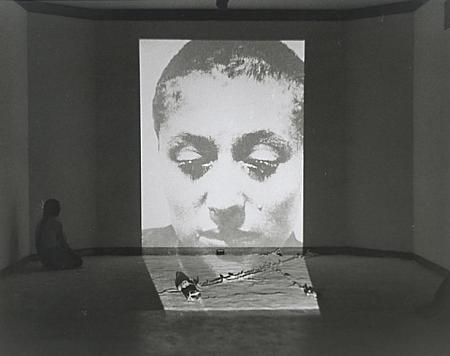
Theresa Hak Kyung Cha
1951 - 1982
Dictee
Theresa Hak Kyung Cha
ifile pdf
(....)
This document is transmitted through, by the same means, the same channel without distinction the content is delivered in the same style: the word. The image. To appeal to the masses to congeal the information to make bland, mundane, no longer able to transcend their own conspirator method, no matter how alluring their presentation. The response is pre-coded to perform predictably however passively possible. Neutralized to achieve the no-response, to make absorb, to submit to the uni-directional correspondance.
Why resurrect it all now. From the Past. History, the old wound. The past emotions all over again. To confess to relive the same folly. To name it now so as not to repeat the history in oblivion. To extract each fragment by each fragment from the word from the image another word another image the reply that will not repeat history in oblivion.
(....)
DictéeTheresa Hak Kyung Cha google books
Dictee is an autobiography that transcends the self. Throughout the work, Cha makes the reader aware of the process of writing. Therefore, the reader struggles with the writer through pages of a rough draft, a handwritten letter, exercises in French grammar, photographs and diagrams. This struggle allows the reader to experience Cha's life and the lives of those she chronicles. There "is a sense of triumph in living through these struggles and of something deeper, more mythical, giving meaning to these lives". Cha was murdered at the age of 31 by a stranger in New York City on November 5, 1982, just seven days after the publication of Dictee.
-
Theresa Hak Kyung Cha : Voices From the Gaps
Theresa Hak Kyung Cha’s DICTEE: a variant text Cristiana Baik _______________________

photo - mw
_______________________
Teaching in Translation: These Pines
Adriana X. Jacobs
words without borders
... Force is power, but it is also translatability. Words move in a poem, which make them tricky to pin down, even when you’re reading in the original. When you translate a word in a poem, you’re aware that you are urging the word (by force, at times) to settle down, but you also hope that it will continue to move, to translate (“never-ending motion” is how Bialik described it). In his poem, “And we must not get excited,” the Israeli poet Yehuda Amichai writes, “Quietly we pass on/ words from one person to another, one tongue to other lips// unawares, the way a father passes on/ the features of his dead father to his son,/ yet he doesn’t resemble either of them,/ he’s just the go-between” (translation by Chana Kronfeld and Chana Bloch). This is the translatability that I look for when I translate poetry, the translatability that remains after I have translated. Translatability is something that we can learn to discern when we read poetry in translation. We can—and should—develop an instinct and sensitivity for this kind of movement in translation. Too often discussions of translated poetic texts focus on the absent word or the uneven phrase, rather than trying to sense and make sense of how a translator has made elements of the original present in other ways in the translation, or even to understand why a translator would choose to leave something out or alter it entirely. These kinds of choices are also very much a part of writing original poetry....(more)
_______________________
Postcolonial Text
Vol 6, No 2 (2011)
Guest Issue: "Glocal Imaginaries"
_______________________

photo - mw
_______________________
The Return of Walter Benjamin’s Storyteller:
Ronald Reagan as the Incorruptible Saint of Political Media
A. Staley Groves
(....)
Reagan’s ubiquitous Americana, telegraphed through folk speak crafted by his minders, is constantly recycled by neophytes. The likes of Sarah Palin, Michelle Bachmann, and Christine O’Donnell present to the American public newer developments of a candidate with special attributes of a storyteller narrator. These acolyte test models attempt to perfect what appears as a neo-romantic element of American cult. Even Barack Obama in his misguided attempt at Burkean consensus invokes Reagan. Given the lack of substance in conservative candidates today, the ultra synthetic reality surrounding political leaders denotes a crisis in authentic discourse. This demands a deeper mediation on the nature of essence, that is, where essence vanishes into the impossibility of nature and further, whether or not we can even think this distinction without committing an incredible fault of curiosity, that is, running the risk of participating in a fully synthetic political discourse. Our naive animality, if not our “bare life” holds the ability to distinguish what was given away to the device that understands more and more of our bodily movement. Since we are accustomed to thinking by way of self-reflection the experience of discovery has always lent itself to the destructive and “secret” mores of an ideology of progress. If I participate, no matter what, things might change. This is a matter limited to technological agency but not fully that: language has entered an eidetic blender. Therefore beyond this tendency to call Reagan acolytes religious lunatics we have entered a time of political eschatology. These candidates and the sophisticated elements of their campaigns gamble on our increasingly faltering capacity to grasp our own capacity for language. How are we to think the appearances of these figures in order to gain access to the displacement of a synthesis of reason, the crafting of thinking we have apparently left behind?
The content of Reagan and Obama’s speeches are stabilizations of a death-lost polity. This phenomenon is analogous to the emergencies of a stock market. The nature of machine-driven trading demands a more emotive check on tensing outcomes. The practice of language is in doubt because the usurpation of discursively built community, that is, communities have adopted the logic of information as the basis for their meaning: broken, without brevity and lack of context. The media device is an interesting object. Its capacity to subjectify or structure perception depends on our lingering from actual reality in the same way the novel and the newspaper did. We cannot however limit our thinking to the object. Appearances are linked to the fact of language. If engagement with forming language continues by way of device habitation, pragmatic legislation which is the synthetic material for rule of law will face continual destruction. Law takes its place in the body. The body marks the limit of freedom by moving to the limits prescribed by law. A perpetual image crystallizing a general condition in the American polity suggests the reflections of salvation, a blindness of vanity or the narcissistic awe of our devices and networks allows essence to meet this law beyond our perceptual capacity of reflection. The law is no longer engaged by the body in formal thinking, it is engaged by whatever imagination may be, arguably the furthest extent of a thinking, human body. Imagination would become the essence of a new law. Neo-romantic vision quests for the real America become the blinding element of political identity dominated by the aesthetics of an obscure authenticity. What is the authenticating body then, for whom? The American polity has hit an ideological bottom. Wandering in portable magic mirrors listening to every revelation spouting about produces a result that pushes once calculative governance by argument into endless oblivion, hence the craft of reason aimlessly drifting into a multi-polar voidance without any legible consensus. The question “how do we think of the multiple?” is perhaps phrased more effectively as “how do we avoid what appears as reasonable discourse?”...(more)
continent. 1.3 (2011)
_______________________

photo - mw
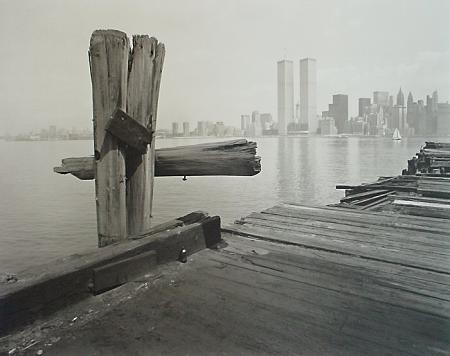
Hudson River Pier
Jersey City
1979
George Tice
1 2
_______________________
Keep the Void Open
Vahé Godel
Translated by Victor Pambuccian
what's to be done
when there's nothing left to do?
rise up
hide away
howl
be quiet
lend an ear,
open the eyes, stick out your tongue, remove your last arrow, settle down, grow warts on your face, lose your footing, find a language, perforate your target, plunge to the bottom of the chasm, hell or heaven, it doesn't matter, stretch out the time of the plunge for as long as possible, sink, endlessly sink, long-drawn-out hesitation between sound and sense, correspondence between image and song, thunder and cry, the eye listens, the ear sees, complicity of the eye and the mouth, the eye drinks, the mouth lights up, the devouring eye and the bedazzled mouth, gesture joining voice, a matter of breathing and fingering, the mouth obeys the finger no less than it does the eye, it's a matter of rhythm, for the most part, which has to do with music, yes, a matter of ear, the distress call sent by hunters lost in the deep woods, thus a rhythm, a sound, a little noise, the sound I make when I feel most at ease with myself, if you want, a kind of audible writing, a music, a rhythm, who says rhythm says form (those mysterious series of little marks, those regular incisions, made on fragments of shinbones, of shoulder bones or of skulls, about 35 000 years before Christ: that's perhaps how the most ancient rhythmic representations look like), a rhythm, a form, a rhythm, a form, it's the rehearsal that generates the rhythm, a form, a music, a music in which there is much silence, a language made up entirely of little dreams, a web of dreams (as in: a web of lies)
what's to be done
when memory sinks
and hope
flies away?
...(more)
TWO LINES Online
Center for the Art of Translation
_______________________

celosia and salvia
photo - mw
_______________________
Urban Warrior
Jerome Sala
legend has it
beneath the surface
of the money self
there’s something richer
once it gets out
it turns you funky
you wear
the colors
of the parrots
and amuse
the beasts
with your talk
statisticians declare
there’s more to you
than they thought
in their studies
they imagine
the ancient emerge
a lost civilization
from under
the streets
one now dressed
in the slang
of the future
...(more)
Three Poems by Jerome Sala
EOAGH
A Journal of the Arts
Issue 7
Jerome Sala blogs at esprsso bongo
_______________________
The Beautiful, Expanding Future of Poverty
Popular Economics as a Psychological Defence
Ashis Nandy
Economic and Political Weekly January 3, 2004
ifile pdf
It is becoming obvious that all large multi-ethnic societies, after attaining the beatific status of development, lose interest in removing poverty, especially when poverty is associated with ethnic and cultural groups that lack or lose political clout. Particularly in a democracy, numbers matter and, once the number of poor in a society dwindles to a proportion that can be ignored while forging democratic alliances, political parties are left with no incentive to pursue the cause of the poor. Seen thus, the issue of poverty is a paradox of plural democracy when it is wedded to global capitalism. And the paradox is both political-economic and moral. Presently the trendy slogan of globalisation can be read as the newest effort to paper over that basic contradiction; globalisation has built into it the open admission that removal of poverty is no longer even a central myth of our public agenda. _______________________
Context: Further Selected Essays on Productivity, Creativity, Parenting, and Politics in the 21st Century
Cory Doctorow
_______________________
A new Lost Decade is leading to revolution
Class warfare accelerating, democracy losing grip
Paul B. Farrell
MarketWatch
Memo to the Super Rich, your high-paid lobbyists and your no-compromise political puppets whose sole mission is destroying the presidency: Yes, you are succeeding. You’re also killing the economy.
Thanks to your self-destructive ideology, America is now in the second of back-to-back Lost Decades. A new one on the heels of the 2000-2010 Lost Decade where Wall Street lost more than 20% inflation-adjusted. Get it? You guys launched America’s second Lost Decade of 21st century.
Yes, two consecutive job-killing Lost Decades. The first created by Wall Street’s obsessive greed. The new one triggered by the widening wealth gap that’s feeding endless partisan political wars powered by Super Rich conservatives hell-bent on re-establishing the same free-market, trickle-down Reaganomics policies that have been sabotaging America for the last generation.
Unfortunately, the new one gets worse: Why? The coming Lost Decade is a backdrop for a wave of class warfare destined to trigger a historic revolution in American politics, bigger than the ‘29 Crash and Great Depression....(more)
via I cite_______________________
The Gaelic
Excerpt from 'Irish and Related Matters'- 'The Best of Myles'
Cur, g. curtha and cuirthe, m.
- act of putting, sending, sowing, raining discussing, burying, vomiting, hammering into the ground, throwing through the air, rejecting, shooting, the setting or clamp in a rick of turf, selling,addressing, the crown of cast iron buttons which have been made bright by contact with cliff faces, the stench of congealing badgers suet, the luminence of glue-lice, a noise made in a house by an unauthorised person, a heron's boil, a leprachauns denture, a sheep biscuit, the act of inflating hare's offal with a bicycle pump, a leak in a spirit level, the whine of a sewage farm windmill, a corncrakes clapper, the scum on the eye of a senile ram, a dustmans dumpling, a beetles faggot, the act of loading ever rift with ore, a dumb man's curse, a blasket, a 'kur', a fiddlers occupational disease, a fairy godmothers father, a hawks vertigo, the art of predicting past events, a wooden coat, a custard-mincer, a blue-bottles 'farm', a gravy flask, a timber-mine, a toy craw, a porridge mill, a fair day donnybrook with nothing barred, a stoats stomach-pump, a broken-
 Flann O'Brien
Brian O'Nolan
b.Oct. 5, 1911
Brian O'Nolan (right)
Dublin's Palace Bar, 1942
(Hulton Archive / Getty Images)
Flann O'Brien at Dalkey Archive Press
_______________________
An interview with novelist Helen DeWitt
by David K. Israel
... Of course there are things you can do to make yourself a stronger writer – they will not be the same for every writer.
You can think of that lunatic Pound: if there is good poetry written in a language, learn enough of the language to read the poetry. If you read something in translation and are blown away, find the text in the original language, get a dictionary, get a grammar, keep your translation to hand, read at least one paragraph of the sentences the author actually wrote....(more)
_______________________

photo - mw

Sandra Kantanen
The Helsinki School
_______________________
Back in the USSR
Extracts from the novel Hytti nro 6 ('Compartment no 6', WSOY, 2011).
Rosa Liksom
Translated by Hildi Hawkins
Moscow hunched itself in the dry, frosty March night, protecting itself from the touch of the icy red sun as it set. The girl entered the train’s last sleeping carriage, found her compartment, compartment number six, and breathed deeply. There were four beds in the compartment, the upper ones folded agains the wall, while between the beds was a small table, on the table a white table cloth and a plastic flower vase containing a bunch of pink paper carnations, faded by time; the shelf above the end of the bed was full of large, untidily secured parcels. The girl shoved her modest old suitcase, the one she had got from Zahar, into the metal luggage space under the hard, narrow bed; her small backpack she threw on the bed. When the station bell sounded for the first time, the girl went to stand by the corridor window. She breathed in the scent of the train, iron, coal-dust, the smells left behind by dozens of cities and thousands of people. Travellers and those who had come to see them off pushed past her, shoving her with their cases and parcels. The girl touched the cold window with her hand and looked at the platform. This train would take her through villages inhabited by deportees, through the open and closed towns of Siberia to the capital of Mongolia, Ulan Bator.
The man was sitting on his bed. On top of his white business shirt he wore a checked shirt that hung open. Under the folds of the white shirt there glimmered a sweaty, muscular belly. The man took a small orange from the table and began to peel it roughly. Once he had eaten the fruit he pulled out a much-fingered newspaper and said from behind it in an irritable tone: ‘Young people are restless. No patience at all. All that dashing hither and thither. Everything goes at its own pace, time is only time.’
The man furrowed his brow and sighed.
‘Look here. All you see is an old geezer whose melancholy soul is filled with a dull peace. Even his heart doesn’t beat with emotion, but through sheer force of habit. No more crazy tricks, not even suffering. Nothing but boredom.’
...(more)
Books from Finland
_______________________
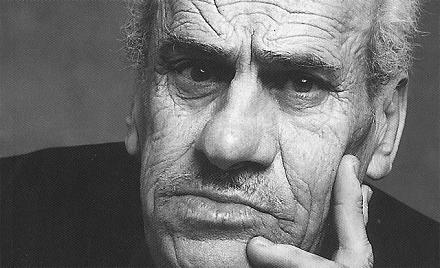
Taha Muhammad Ali
1931 - 2011
Empty Words
Taha Muhammad Ali
translated by Peter Cole
Ah, little notebook,
yellow as a spike of wheat
and still as a face,
I’ve protected you
from dampness and rodents
and entrusted you with
my sadness and fear,
and my dreams—
though in exchange I’ve gotten from you
only disobedience and betrayal…
For otherwise where are the words
that would have me saying:
If only I were a rock on a hill…
unable to see or hear,
be sad or suffer!
And where is the passage
whose tenor is this:
I wish I could be
a rock on a hill
which the young men
from Hebron explode
and offer as a gift to Jerusalem’s children,
ammunition for their palms and slings!
(....)
Is it fair, little notebook,
yellow as a spike of wheat
and still as a face,
that you conceal
what you cancel and erase,
simply because it consists of empty words—
which frighten no enemy
and offer no hope to a friend?
...(more)
_______________________

Kalle Kataila
_______________________
The Sea Spoke in Tongues
Robert Gibbons
October 4, 2009
Turning, I suppose, is the word for reaching the age of sixty-three today, for
while walking alone the Sea spoke in tongues, spoke in as many tongues as
passengers on the Holland-America Line cruise ship, whom I also overheard as
they disembarked & strolled around the city & parks & seashore, but I doubt they
heard the Sea speak as it spoke to me in tongues about the Time before Birth.
Long-ago gestations of cells algae amoebas eggs & myself & all of us & those to
come. We may fret about Death, but not about the Time before Birth. The Time
before birth the Sea said, did not hurt, nor will Death. The Sea receding in its tide
spoke to me. The Sea beside me in my walk alone today turning sixty-three
spoke, or sung a gentle lullaby about Time before Birth, & that it did not hurt,
nor will Death.
_______________________
Inferno
Gyršir Elķasson
Translated from Icelandic by Victoria Cribb
(....)
We came to the restaurant, where we were met by the smell of Swedish meatballs and I discovered that I was hungry. I dawdled by the entrance, looking into the room. There were not many people around; a few seated at the tables, others lining up at the counter, waiting for meatballs, potatoes, gravy, and lingonberry jam to be shoveled onto their plates.
The autumn sun poured into the room and I found myself staring at a man who was sitting alone at a table by the window. He had hunched shoulders, red hair, and a wispy beard, and wore a black coat with a turned-up collar and a belt of the same color that trailed on the floor. He was nursing a beer, gazing into the glass as if he could see nothing else, or as if the glass were a mirror that reflected the whole world.
I had the feeling I knew the man, but couldn’t immediately place him. Then suddenly it dawned on me.
It was August Strindberg.
Strindberg—who had feared hell above all else, a fear he had described in his writings— had ended up after death here, in a branch of Ikea in Iceland. This was the man who had claimed that Lund was hell on earth but knew little of Iceland and nothing of Ikea, which, after all, hadn’t existed in his day. As I watched, he seemed to slump lower and lower over his glass, condemned for all eternity. The man who had written in his diary: “Anyone who says that life is wonderful is either a swine or a halfwit.”
“Look over there,” I said to my wife, pointing across the room....(more)
Words without Borders
October 2011: Iceland
_______________________
Existing in New York City: Searching for a Soul
The Daily Growler
(....)
As I've always said, the Sun is our true God, the source of life, whether human life or what we refer to as animal life--even though we ourselves are nothing more than animals--and, yes, I know, that's Behavioral Psychology thinking, but then it's also just plain ole common sense thinking, too. Our minds are capable of culling out the bullshit from golden purities--however, due to the fact that human beings die the same as all things die (even the Sun is dying (George Gamov wrote a book about it))--only the earth is "reasonably" immortal--though surely one day in a state of Chaos, even this planet will explode and become stardust), our instincts, these basic drives within us that carry both protective and suicidal intentions, try, through our consciousness and imagination, to devise principles that convince us we are actually supernatural, immune from mere mortality. But how, the doubter asks, is this possible when just like the family dog died after living so many years, so did the rest of the family eventually, so what the dog never went to a religious ceremony in its life and so what the rest of the family were devout true believers in the religious concept of living forever--NOT, of course, on this planet Earth, but rather in the supernatural sense that something inside us called a Soul is ethereal, is spiritual, not material or matter; therefore, it is that imaginary part of us that lives forever. A very handy insert in an otherwise totally unbelievable manual of explaining life and death.
When you base your actions on false launching pads, you end up where most mystics, wizards, priests, prophets, alchemists, theologians, gamblers, whores, banker criminals, perverts, Atheists end up: DEAD, six-feet under, eventually rotting or being eaten back into the biological and material aspects that make up this planet We humans call Earth, a planet given life and light by our true god, the Sun, a mortal god, don't you forget. When Christian Fundamentalist backward thinkers say that God will never destroy the earth, they overlook the fact that God has no knowledgeable control over the Sun, a planet or star that the Christian God thought circled the Earth.
...(more)
_______________________
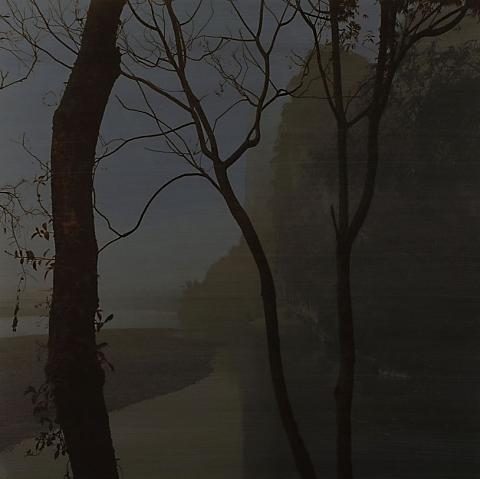
Sandra Kantanen
_______________________
How to Occupy an Abstraction
Mc Kenzie Wark
verso
The occupation isn't actually on Wall Street, of course. And while there is actually a street called Wall Street in downtown Manhattan, "Wall Street" is more of a concept, an abstraction. So what the occupation is doing is taking over a little (quasi) public square in the general vicinity of Wall Street in the financial district and turning it into something like an allegory. Against the abstraction of Wall Street, it proposes another, perhaps no less abstract story.
The abstraction that is Wall Street already has a double aspect. On the one hand, Wall Street means a certain kind of power, an oligopoly of financial institutions which extract a rent from the rest of us and in exchange for which we don't seem to get very much. "What's good for General Motors is good for America" was the slogan of the old military industrial complex. These days the slogan of the rentier class is: "What's good for Goldman Sachs is none of your fucking business."
This rentier class is an oligopoly that makes French aristocrats of the 18th century look like serious, well organized administrators. If the rhetoric of their political mouthpieces is to be believed, this rentier class are such hot house flowers that they won't get out of bed in the morning for less than a thousand dollars a day, and their constitutions are so sensitive that if anyone says anything bad about them they will take their money and sulk in the corner. They have, to cap it all, so mismanaged their own affairs that vast tracts of public money were required to keep them in business.
The abstraction that is Wall Street also stands for something else, for an inhuman kind of power, which one can imagine running beneath one's feet throughout the financial district. Let's call this power the vectoral. It's the combination of fiber optic cables and massive amounts of computer power. Some vast proportion of the money in circulation around the planet is being automatically traded even as you read this. Engineers are now seriously thinking about trading at the speed of light. Wall Street in this abstract sense means our new robot overlords, only they didn't come from outer space.
How can you occupy an abstraction? Perhaps only with another abstraction....(more)
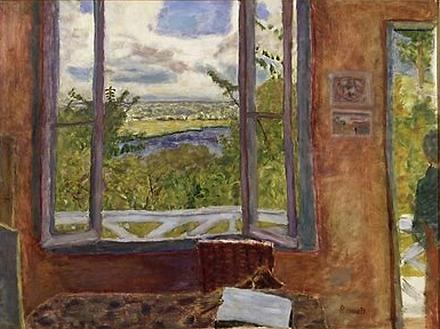
Open Window at Vernon
Pierre Bonnard
b. Oct. 3, 1867
_______________________
"You Who are the Bureaucrats of Empire, Remember Who We Are"
Don Mitchell
address at The Maxwell School of Citizenship and Public Affairs at Syracuse University
(....)
... I am probably also different than you. I find the construction of the American Empire to be utterly reprehensible. I find our diplomatic and military hypocrisy not only on the world stage but at home too to be abhorrent. I find our - that is my and your state's - role in the world, a role defined by the raw exercise of power, a startling ignorance of what other peoples are like and what they want, to be a sheer exercise not only in arrogance, but in violent bloody-mindedness. I find our reliance on force, on arms, on the technology of death, coupled with our disregard for others' lives - the thousands of Afghani civilians directly killed by our bombs as they missed Mohammed Omar and Osama bin Laden; the at least ten thousands Iraqis so far killed; the fifty to hundred thousand killed in Dresden; the more than a hundred thousand incinerated or condemned to a cancerous death in Hiroshima and Nagasaki; the two million Vietnamese - I find this disregard for other peoples' lives to be appallingly anti-human, appallingly anti- you-and-me. Bin Laden's tactics are the tactics of Hell. How, tell me how, ours are any different. He bombs cathedrals of commerce; we bomb Mosques, pharmaceutical factories, weddings, embassies, and whole villages that must be destroyed in order to be saved. But we profess to be the beacon and lovers of "freedom" - so on top of it all we are hypocrites
So I am probably different from you, because I doubt you see the world in these terms, for you are the bureaucrats of Empire: it is you, who, in whatever way large or small, are essential in creating a world I despise. I have no doubt that your motives are good. I have no doubt that your beliefs are true. You undoubtedly see security and patriotism and freedom and duty, where I see death and arrogance and the near-constant illegitimate use of power. So maybe I am different from you. But I am not different from the rest of the world. In fact, I am likely right in line with the majority. And that is my practical message to you: there are a lot of us out there. ...(more)
History Is A Weapon
_______________________

John Craxton
b. Oct. 3, 1922
_______________________
from “Company”
Samuel Beckett
(....)
Your mind never active at any time is now even less than ever so. This is the type of assertion he does not question. You saw the light on such and such a day and your mind never active at any time is now even less than ever so. Yet a certain activity of mind however slight is a necessary adjunct of company. That is why the voice does not say You are on your back in the dark and have no mental activity of any kind. The voice alone is I company but not enough. Its effect on the hearer is a necessary complement. Were it only to kindle in his mind the state of faint uncertainty and embarrassment mentioned above. But company apart this effect is clearly necessary. For were he merely to hear the voice and it to have no more effect on him than speech in Bantu or in Erse then might it not as well cease? Unless its object be by mere sound to plague one in need of silence. Or of course unless as above surmised directed at an other.(....)
In another dark or in the same another devising it all for company. This at first sight seems clear. But as the eye dwells it grows obscure. Indeed the longer the eye dwells the obscurer it grows. Till the eye closes and feed from pore the mind inquires, What does this mean? What finally does this mean that at first sight semmed clear? Till it the mind too closes as it were. As the window might close of a dark empty room. The single window giving out on outer dark. Then nothing more. No. Unhappily no. Pangs of faint light and stirrings still. Unformulable gropings of the mind. Unstillable.
…
For why not? Why in another dark or in the same? And whose voice asking this? Who asks, whose voice asking this? And answers, His soever who devises it all. In the same dark as his creator or in another. For company. Who asks in the end, Who asks? And in the end answers as above? And adds long after to himself, Unless another still. Nowhere to be found. Nowhere to be sought. The unthinkable last of all. Unnameable. Last person. I. Quick leave him....(more)
_______________________
Drunkenness sped my run through the martyred oaks
Which bled prophetically while day
Light fell mute over the blue trucks
I remember so many things
So many evenings rooms walks rages
So many stops in worthless places
Where in spite of everything the spirit of mystery rose up
Like the cry of a blind child in a remote train depot
- Louis Aragon,
"poem to shout in the ruins"
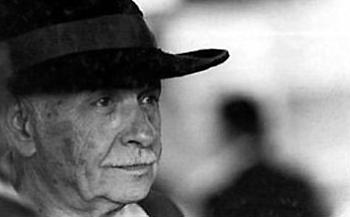
Louis Aragon
b.Oct. 3, 1897
Déji: There’s no last judgment
Louis Aragon
Translated by Sylvia A. Manning the outlaw poetry network
.....................................................
Out of Louis Aragon’s “Poem to Shout in the Ruins”
Let’s spit the two of us let’s spit
On what we loved
On what we loved the two of us
Yes because this poem the two of us
Is a waltz tune and I imagine
What is dark and incomparable passing between us
Like a dialogue of mirrors abandoned
In a baggage-claim somewhere say Foligno
Or Bourboule in the Auvergne
Certain names are charged with a distant thunder
Yes let’s spit the two of us on these immense landscapes
Where little rented cars cruise by
Yes because something must still
Some thing
Reconcile us yes let’s spit
The two of us it’s a waltz
A kind of convenient sob
...(more)
_______________________
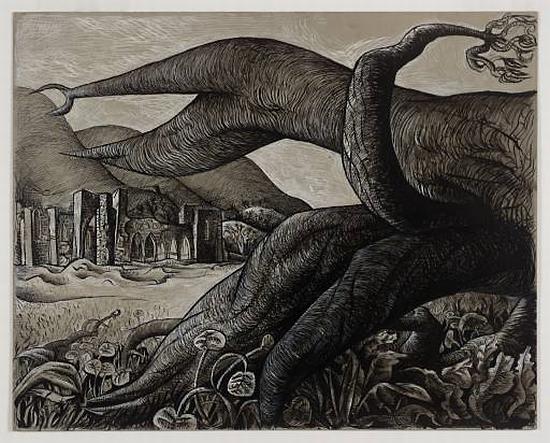
Llanthony Abbey
1942
John Craxton
_______________________
History
Joanie Mackowski
............................... back before the old
something-from-nothing routine, before the rootless
abraxas when we blinked and didn’t notice
who stood or cried or threw its drink in whose face,
before we fumed inside our lonely orifice
or walked across the bridge as it assembled
under our feet, our feet fangling the first simple
dance steps up from the swamp, the ladders
of DNA and wrack, our bony love letters
eeked in rock for future generations—
then up from the snowy pages, the engine
unzipping the trees from the horizon,
we sobered into our bright isolation.
...(more)
guernica
Joanie Mackowski at the Poetry Foundation

Alexandr Sennikov "No, we could never see them like this, in this light evoking Flemish still-life paintings, in these calculatedly random and heroic compositions. Still we remember them exactly, as we would swear to exactly remember the smell of that madeleine. For seventy years these objects had inhaled that history and those meanings which they are now emitting by way of slow glasses as long as we live, as long as there will be someone who feels to exactly remember them."
- Studiolum
_______________________
Benjamin's Desktop:
Unpacking the Phenomenon of Literature Online
Adam Fieled
(....)It should go without saying that, if literature on the Net were not a subject that had a good amount of heft, where nuances and complications were concerned, it would not be worth writing about. Bataille’s name for the general overabundance of life on earth, the “accursed share,” also supplies a necessary wedge into the subject. Literature has proved, over a long period of time, that it does not need the Net to validate it. It is true of literary society as well as society in general that it “produces more than is necessary for its survival; it has a surplus at its disposal. It is precisely the use it makes of this surplus that determines it”. So it is with literature on the Net: the surplus quality of Net publishing will be determined by how (and why) it is used. One possible use for literature on the Net, and also the investigation of the Net as a process, is that it can function as an antidote to the atrophied armature of post-modern thought that still hangs over avant-gardists on two continents. Post-modern poetics, especially in America, has always favored indeterminacy as a mode of expression; but I use the term “atrophied” because this kind of poetics has become closed on indeterminacy. Poetry, which has as a component part of its function the imperative to engage emotional and psychological levels, when made indeterminate as to at least some connotations, is only a few notches past banality. Net processes open indeterminacy up for investigation, by being determinative; you are in this place, doing this, and hiding is not an option. If a crisis forces you to react, the impulse towards banality cannot be followed. The Internet opens up vistas for psychologies and emotions to develop, beyond theoretical baggage. It could be the therapeutic solution to the traumas of post-modern practice, for those still young enough and dynamic enough to make moves. ...(more)
via Poets and Writers Picnic
_______________________
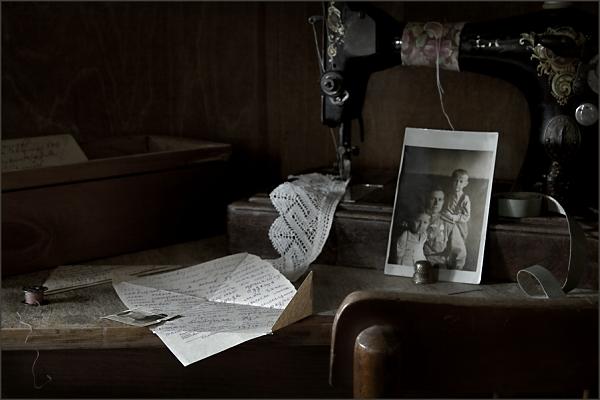
Alexandr Sennikov informed commentary on those triangular letters
Studiolum
Poemas del rķo Wang
_______________________
from Taking-Light [Agaw-Liwanag]
Bomen Guillermo
Translated by Jose Perez Beduya and Allan Popa
IV
There is no road leading back from a path going forward
world is what departs
world is what is departed from
There is a letter needing
to be delivered
inside the mouth
There is no path leading forward from a road going back
world is what is departed from
world is what departs
...(more)
High Chair
Issue # 14 : January - June 2011
_______________________
Reading Ranciere
edited by Paul Bowman and Richard Stamp
mediafire pdf
from the Introduction by Paul Bowman and Richard Stamp
... over this 40-year period, Rancičre’s work has never ceased to call into question the status, rhetoric and authority of mastery. From his refusal of Althusser’s ‘philosophy of order’ and the founding of Les Révoltes Logiques, via his nineteenthcentury archival work on workers’ history and the forgotten pedagogue, Joseph Jacotot, through to his more recent thinking of politics and aesthetics in terms of the ‘distribution of the sensible’, Rancičre’s work has been characterized by polemical interventions into an increasingly diverse range of fields; but they do not add up to a ‘system’ or a ‘theory’. Rather he has described his ‘method’ as consisting in making interventions into always particular situations, specific instances in which ideas are ‘at work’: ‘What Rancičre tries to point out in any situation is the polemical nature that makes it an object of thinking, that situates it in a field of tensions’. Ultimately, these always-specific interventions aim to present his readers with scenes of struggle over what politics is, of a disagreement or dissensus that interrupts and redistributes that system of places – the distribution of the sensible – that allots to each his or her proper role and function. In Rancičre’s work, the very place of (theoretical) mastery and therefore struggle over the object or territory to be analysed – whether it be a political ontology, the figure of the worker or the aesthetics of the sublime – always gives rise to the fundamental question: ‘who is qualified for thinking at all?’
_______________________
instructions pour gens d'affaires 1
Roger Gathman
The double change brought about under capitalism – the creation of wage labor under the regime of industrialization and the introduction of a revamped and quantitatively huge sphere of circulation under the regime of consumerism – is one that particularly effects the place of the clerk. The fictional commodities of land and labor, and the international trade in everyday household and psychoactive commodities – sugar, chocolate, alcohol, coffee - that underlay the great transformation required a new system of description and calculation that opened up a new vocational form – and into that form came the clerk. When Marx speaks of the way the bourgeois economists invert the processes that constitute the nature of the commodity so that it seems like the commodity comes first and constitutes the unsurpassable horizon of the world, what he is really talking about is the codification of the economy from the point of view of its managers in the sphere of circulation – for them, gazing at the world through their maps, spread sheets, instructions, and sales, the exterior world really does seem to be a price-driven market system, a great dualism between demand and supply....(more)
_______________________

Alexandr Sennikov
_______________________
Kristeva Reframed
Estelle Barrett
ifile pdf
In a world immersed in readymade images, consumer advertising
and the bureaucratised language of institutions, Kristeva’s work
explains how art or aesthetic experience is one of the few means
by which we can generate and access images that are linked to our
vital and lived experiences and that have the capacity to engender
personal, political and social renewal. For Kristeva art or aesthetic
experience is a practice that constitutes both a subject (a sense of
self), as well as an object that has the power to transform meaning
and consciousness. She views the production of a work of art as
continuous with the production of the life of the individual, as a
dynamic and performative process that moves between and
across embodied experience, biological processes and social and
institutional discourses.
This book will examine some of the major ideas in Kristeva’s
work to demonstrate how her view of language and aesthetic
experience has specific relevance for elucidating visual practices,
including painting, photography and film. Kristeva’s emphasis on
practice and process demonstrates how art itself provides us with
the means for discovering and naming the knowledge it produces.
In order to grasp this,we need to engage closely with key concepts
in her work and then examine how they can be put to use by art
makers, art viewers and others who are interested in studying the
creative process and the relationship between the artist and
artwork, the art object and audiences of art.
|
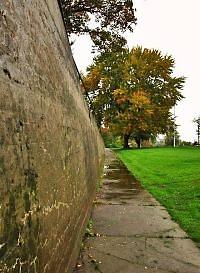
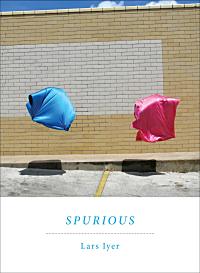


 The Age of Briggs & Stratton
The Age of Briggs & Stratton




































